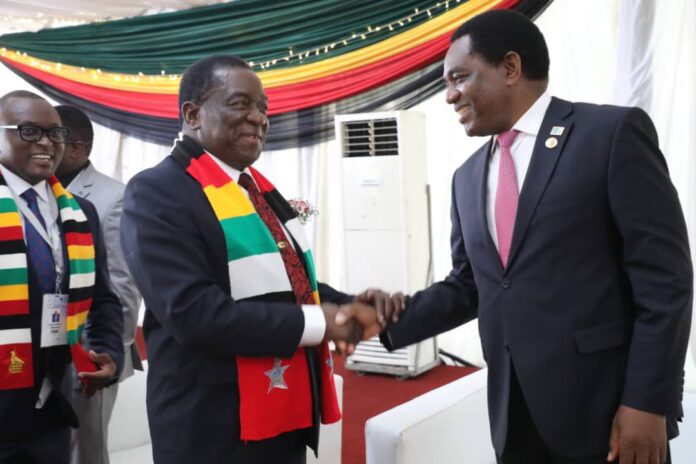President Emmerson Mnangagwa is talking to his Zambian counterpart Hakainde Hichilema about the ongoing El Niño-induced drought after Zambia declared a National State of Disaster and Emergency last week, NewsDay can report.
Briefly speaking to the Press during the seven-day 56th session of the United Nations Economic Commission for Africa Conference of African Ministers of Finance, Planning and Economic Development in Victoria Falls on Monday, Mnangagwa said there were behind-the-scene talks between him and Hichilema over the two countries’ food security situation.
Responding to NewsDay’s enquiry whether the Zimbabwean leader would follow Zambia in declaring a National State of Disaster and Emergency given its worsening effects on local energy and food security, Mnangagwa said: “Fortunately, my dear brother, my younger brother, HH (Zambian President Hakainde Hichilema) discussed with me this morning and it’s not prudent to divulge what two heads of State are discussing about that issue until certain things have happened, then you will know. But we have been discussing this morning, on the same issue you are asking about.”
Responding to other journalists, Mnangagwa said the time had now come to implement measures in agriculture to mitigate against such weather events like El Niño.
“This morning, I have been discussing with one or two heads of State. We felt that we need to promote irrigation coverage so that whether there is drought or no drought at least we have enough irrigation hectarage to give food security,” he said.
Southern Africa has been battling worsening climatic conditions given this 2023/24 agricultural season which is characterised by the El Niño phenomenon that has caused erratic rainfall.
Mnangagwa, who officiated during the opening of the conference on Monday, as Zimbabwe took over the chairmanship of the event from Uganda, called for a new economic model during his speech.
“For us in southern Africa, the ongoing El Niño phenomenon is currently affecting weather patterns in some parts of the region, with our agriculture and energy sectors negatively affected. These realities necessitate structural shifts towards resource-efficient, non-polluting, equitable models of economic growth,” he said.
Source – newsday

I thought he should’ve been talking to ecl and ba fuledi matako?
Let the engagement broaden to include how Africa can start to reverse the effects of global warming